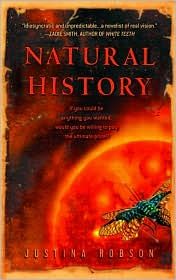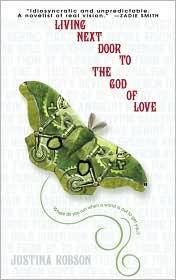Guest Blog: Justina Robson

I wrote [Natural History] after writing Mappa Mundi, which is a novel about the development of nanotechnologies and the use of them to infiltrate and control human bodies. It also followed Silver Screen in which a more far future version of the same thing was deployed to create the simulacrum of a person (and indeed, a great many other things, possibly extending to anything). This seems to be a prevalent feature of my work, the big idea I can’t stop worrying like a dog with a favourite stick. I think every writer has one or two of these in a lifetime--that’s my excuse, anyway.
Natural History once again has nanocytes at its core and, once again, they are the hidden machineries. After Mappa Mundi’s here-and-now setting I wanted to try for something more like a space opera to stretch my wings, plus I had become finally and fatally disillusioned with the space programme. After spending a childhood and young adult life convinced we would make a steady progress through the solar system and then beyond I went on holiday to Africa not long after turning 30 and did the bourgeoisie-trek up Mount Kilimanjaro. Wow. It was only after hauling my increasingly struggling physical form up four vertical miles that I realized exactly how tiny and precise are the conditions for human life. We live in a pocket 120 trillion metres square and four miles high (sorry for mixing the scales there) and of that 70 percent is water surface we have to go about in a boat on. That leaves 149 km square metres of land surface of all types for everyone and everything that doesn’t swim plus the skinny little layer of breathable gases which isn’t even thick enough to cover up all the land (if you count Everest and the highest peaks as being unsurvivable at anything except the shortest term, which they are). Also, for all its mystery and complexity and marvel, this is a closed, finite system. Without some serious add-ons from other massive objects like asteroids or similar, there can only be the circle of energetic exchange (life and inorganic chemistry) in action. Also, our tiny surface skim world is vulnerable to assaults from the planet itself--eruptions from the mantle which can seriously throw its delicate operations out of whack. In short, I sat on The Saddle, where not even bacteria survive, feeling sick and paranoid from lack of oxygen with the ‘death wish spirit’ of such places looming large over me and I realized--that’s it. The only places we can ever go as we are are places like this and in all this universe the only place like this that we even know about is a fragile little surface tension layer right here that could be ruined for us in the blink of a volcanic eye. My mind was blown. And on the heels of that I thought, ‘we are never going to thrive in space--all that TV show naval opera is fun fantasy bullshit’.
It was quite a blow, because my business is fun fantasy bullshit and I wouldn’t say I ever believed the future would be that way, I had just somehow sort of hoped it might be. But the biggest problem with going into space is having to carry your environment with you. Since there seems no hope of reaching a new environment (find one first, then persuade me it’s even possible) within anything like a span of time we are capable of getting our heads around this is a bit of desperate prospect. And right then I realized space was going to be something like the rest of the world in most people’s eyes--a difficult resource to be exploited, the local solar system just untapped veins of minerals and gas. Humans today mostly do not see themselves as a parasitic infestation of a tiny, finite pocket. The current mindset is obsessed only with human things, very inward and downward looking. Not up to the stars. You can go to Mars and create a new world but there’s nothing new about it or Martian or progressive when your mindset is still looking for the next fat grub and or the next fat profit. (Kim Stanley Robinson’s Mars Trilogy explores this very well if you are interested in considering the politics of solar system expansion). I guess I had a romantic crisis. And I thought ‘bugger it, if we can’t go as we are, we’ll go another way! I will have my beautiful, dramatic space opera scenario. I will! And some of these people will have minds that MOVE ON too.’ Also, if taking the environment is so hard and so perilous, surely it makes more sense to change yourself to fit the conditions of your new location--be it deep space, gas planet atmospheres or whatever. So, wheel in the ubiquitous grey goo and presto! The Forged. Human beings in mind, extraordinary creatures in body.

The trouble with employing the goo, for me, is that it is a technology so advanced I have trouble imagining us making it. I can just about imagine making the Silver Screen version of goo, which is a set of basic builder bots that execute a program and ‘die back’. Plus, I had to just let myself suppose that our mastery of science would allow us almost infinite engineering capacity. That is one hell of a leap from my present view on our abilities. One great big giant step for imagination. But anyway, on with the show and I would just have to cry about my hard SF aspirations later. Suppose that we COULD create real beings that were totally at home in these weird environments. It’s a bit like creating an alien, except that I also had the express intent of keeping them absolutely human inside. I tried to manage this by creating a virtual space to which they were all connected in which their avatars were able to move freely and interact as they liked, also, normal humans could visit in avatar forms. However, as I was writing Natural History I was also pregnant with my first child and I knew exactly how much even a minor tweak in physical condition can alter everything about one’s perception of oneself and the world. Doing something a billion times more radical could not result in a virtual Beverly Hills 90210, plus people do not go to avatar worlds to be themselves as they are in the human world, they go to the masquerade ball as any MMORPG will show.
So in the set up I had human beings exploiting the solar system by creating people who were suited to their task. Cue the slavery of the industrial revolution and the curse of the civilized world! We can all kid ourselves about our choices as long as we have enough money to opt out these days but if you were fit for only one purpose and couldn’t exist without doing it…that’s a whole other deal entirely. Suddenly there was a new relationship between the Forged and the Old Monkeys (as they spitefully named the humans of Earth) and it was fraught with tensions. At least when you are born by natural methods the state of your being isn’t really up for arguing about with a higher authority (well, I guess you can try arguing and see where it gets you…) So now I realized there were all these quasi-religious and social and political ramifications that were enormously important and reflected very keenly the way I felt about my own relationship to my society and culture and our position in the world - the world of people but also the environment itself. I hoped that my characters would do the walking for me and go somewhere interesting with all this.
Zephyr Duquesne is a person who explores at lots of levels for me--she is one thing but she dreams of being other. She’s smart enough to know that if you can dream it you can embody it but she’s scared when the moment comes to test that theory with the offer of a voyage of a lifetime to explore a new world beyond the reach of any human telescope. She has a genuine distance internet romance with someone, completely genuine, even though the whole time she finds every excuse never to meet in person. Deep down she doesn’t want to have to face a moment where she meets something that might be alien to her in case she can’t handle it and everything is ruined. Then she goes on a mission to find real nonhuman aliens. She dares and she hides, she expands and she contracts, like any life form or person moving into a new area. I was sad for her at the end when she could not come back, and knew her lover was Forged and that she would never see him for real. By then she was ready to.
Ah, can’t go back - there’s another lasting theme of mine. Here there is a concrete reason for this which is that the Forged humans discover a parasitic alien tech that grants awesome powers…but using it means you are not allowed to return to contaminate the prime world.
Isol’s story is also one close to my heart--a self sufficient paragon requiring no human contact (making her quite odd by any stretch of human, possibly some version of sociopath) she is the first to be forced to accept alien contact in a life or death encounter. What most repels her (intimacy) also brings her her heart’s desire (to discover a new world). She believes that with the alien tech she can bring true liberation to the Forged and free them from the wage slavery of old Earth. But it is a two edged sword. As liberating as its seemingly infinite, imagination only limited might can be, it exacts a Faustian price--the technology consumes the body and remakes it to be the physical avatar of an alien consciousness. Frying pan to fire.

Ah, can’t go back--there’s another lasting theme of mine. Here there is a concrete reason for this which is that the Forged humans discover a parasitic alien tech that grants awesome powers…but using it means you are not allowed to return to contaminate the prime world. For a fuller examination of this fresh hell you need to read the next book set in the future of Natural History, Living Next Door To The God of Love.
You know, writing about this makes me realize how much is in it! I could go on but I think I’ve tested your patience long enough. I hope you had some mind-candy and heart-candy fun reading Natural History.
Justina Robson was born in Yorkshire, England in 1968. She studied Philosophy and Linguistics at University. After only seven years of working as a temporary secretary and 2.5 million words of fiction thrown in the bin, she sold her first novel in1999.
Since then she has won the 2000 amazon.co.uk Writers’ Bursary Award. She has also been a student (1992) and a teacher (2002, 2006) at The Arvon Foundation, in the UK. Her books have been variously shortlisted for The British Science Fiction Best Novel award, the Arthur C Clarke Award, the Philip K Dick Award and the John W Campbell Award.
In 2004 Justina was a judge for the Arthur C Clarke Award, on behalf of The Science Fiction Foundation.
Her website is www.justinarobson.comJustina Robson will be answering under the LJ handle justinar.